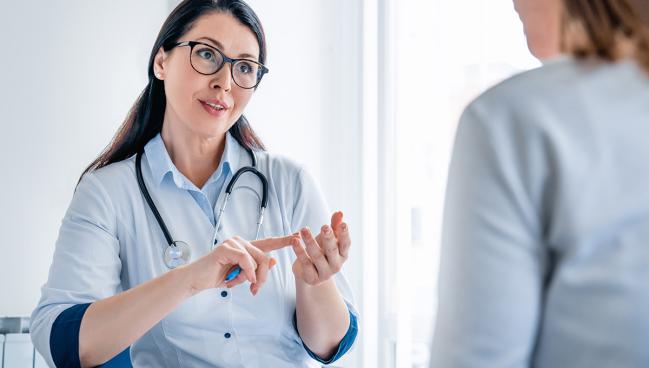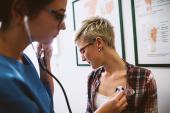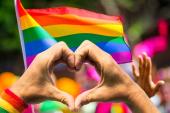CV Health Profiles Concerning in Bisexual Females, US Data Suggest
The study highlights risk disparities by sexual identity, with an emphasis on the need for tailoring of CV interventions.

Compared with heterosexual females, those who are bisexual have less favorable scores on standardized measures of CV health, new data show. The same study, however, found that gay males tend to have better CV health profiles than their heterosexual counterparts.
Additionally, both bisexual females and gay/lesbian adults have greater exposure to nicotine—through either their own use of combustible tobacco products or by second smoke—than heterosexual adults.
“We wanted to conduct one of the first studies that would look at cardiovascular health in sexual minorities in a comprehensive manner rather than looking at individual risk factors,” said Billy A. Caceres, PhD, RN (Columbia University School of Nursing, New York, NY), who led the new study, published online February 22, 2023, in JAMA Cardiology. “Risk factors don’t exist in a vacuum. People who smoke . . . might also have higher risk for hypertension or diabetes, so the combination of risk factors is a greater predictor of their risk for cardiovascular disease than one factor alone.”
The new findings are in line with a growing body of research suggesting that sexual minority adults in the LGBTQ+ community have certain unique stressors, including discrimination, which may lead to worse CV health compared with cisgender, heterosexual adults. Bisexual women and gay men are about 20% more likely to be diagnosed with hypertension than heterosexual individuals, with bisexual women at higher risk of untreated hypertension.
“There is sort of a consensus in the field that bisexual individuals have greater risk for things like mental health issues and substance use, and now we’re taking that further and looking at chronic conditions like cardiovascular disease and seeing similar patterns,” Caceres told TCTMD. “It confirms and further shows us that these groups of bisexual individuals, particularly bisexual women, really need more attention moving forward, not only in research, but also in terms of clinical interventions.”
The reasons why bisexual females have worse CV health in relation to all other groups, including bisexual males, is likely multifactorial but may be partially explained by high rates of living in poverty relative to other sexual identity groups or delaying healthcare for financial reasons, both of which may lead to less preventive screening for CVD and other chronic conditions.
“Other work has found that [bisexual women] are more likely to report that they can't seek healthcare because of reasons that have nothing to do with cost. Things like they didn't have proper transportation, they couldn't take time off work, etc,” Caceres added. “We also know that overall—and this is true for both bisexual women and lesbian women—the field of sexual minority health has had a larger focus on HIV and AIDS, with [emphasis on] gay and bisexual men.”
With research about the intersection of sexual identity and health so relatively new, he said, many bisexual and lesbian women also probably have no idea about studies on risk factors that are being done in their own populations.
Elevating Patient Discussions
For the study, Caceres and colleagues used the American Heart Association’s recently revised Life’s Essential Eight, which assesses poor, intermediate, or ideal CV health based on specific metrics : dietary quality, physical activity, exposure to cigarette smoking, body mass index (BMI), fasting blood glucose, total cholesterol, blood pressure, and the newly introduced element of sleep.
Scores were analyzed for 12,180 adults (mean age 39.6 years; 49.5% female; 11.1% Black, 15.7% Hispanic) in the National Health and Nutrition Examination Survey (NHANES). Participants self-reported current and lifetime combustible tobacco use and secondhand smoke exposure, frequency and duration of weekly moderate and vigorous physical activities, diet quality, and sleep duration, while biological measures were assessed using standardized assessments. Cumulative ideal CV health scores were categorized as low (0-49), moderate (50-79), or high (80-100).
Overall, bisexual females had less favorable BMI and lower cumulative ideal CV health scores (< 50) compared with heterosexual females. There were no differences in ideal CV health scores for lesbian females and females with other sexual identities in comparison to heterosexual females, and no differences between other groups of sexual minority adults and their heterosexual counterparts.
Bisexual males were more likely than heterosexual males to have hypertension (adjusted OR 1.98; 95% CI 1.10-3.56) and to be prescribed antihypertensive medications (adjusted OR 2.20; 95% CI 1.12-4.32).
Compared with heterosexual men, gay males had more favorable diet, BMI, and glycemic status scores, although they had higher rates of tobacco use. While the reasons for these outcome differences are unclear, Caceres and colleagues say they may align with documented desires to conform to body ideals of thinness, excessive exercising, and dieting among gay men.
By people being able to have open conversations around sexuality and [their] personal lives, it might uncover things that otherwise wouldn't be acknowledged. Billy A. Caceres
According to Caceres, incorporating discussions about sexual orientation and gender identity into routine healthcare intake assessments is a slowly growing trend that will help in earlier identification of specific CV risks.
“As providers, I think there is so much more of our own discomfort with getting into topics around sexuality in a context that don't necessarily have to do with sexuality than there is for patients,” Caceres added.
For bisexual patients, who often feel stigmatized and like they don’t belong in gay, lesbian, or heterosexual communities, this may be a particularly crucial step in their health journey.
“There may be a lack of awareness about the true health impacts of some of the behaviors or things that they're engaging in, and by people being able to have open conversations around sexuality and [their] personal lives, it might uncover things that otherwise wouldn't be acknowledged,” Caceres added.
L.A. McKeown is a Senior Medical Journalist for TCTMD, the Section Editor of CV Team Forum, and Senior Medical…
Read Full BioSources
Caceres BA, Sharma Y, Ravindranath R, et al. Differences in ideal cardiovascular health between sexual minority and heterosexual adults. JAMA Cardiol. 2023;Epub ahead of print.
Disclosures
- Caceres reports no relevant conflicts of interest.





Comments